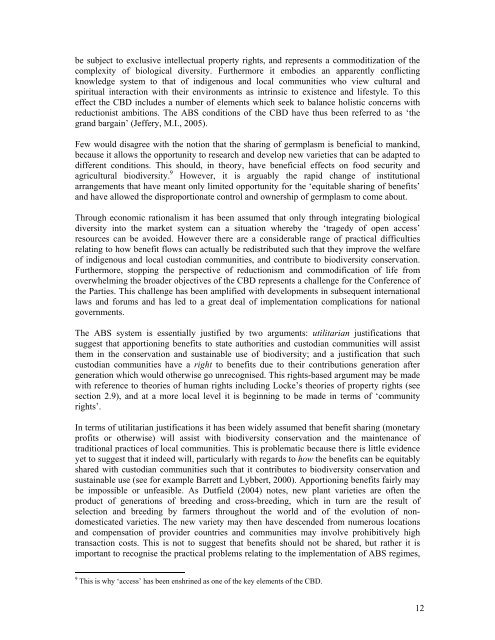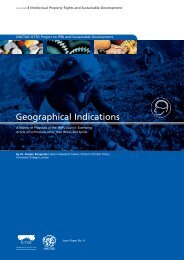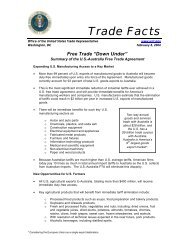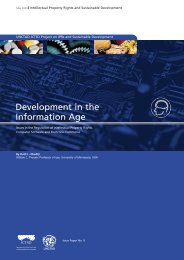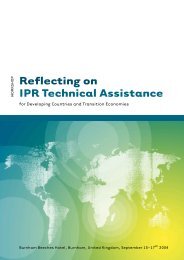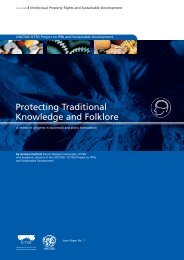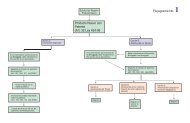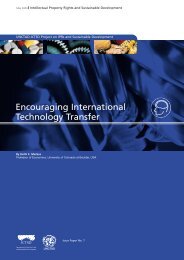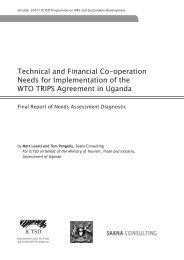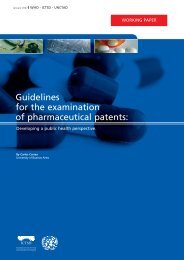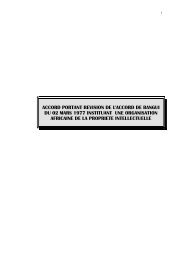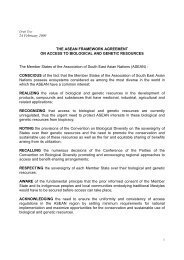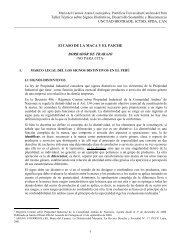Governance and Micropolitics of Traditional ... - IPRsonline.org
Governance and Micropolitics of Traditional ... - IPRsonline.org
Governance and Micropolitics of Traditional ... - IPRsonline.org
You also want an ePaper? Increase the reach of your titles
YUMPU automatically turns print PDFs into web optimized ePapers that Google loves.
e subject to exclusive intellectual property rights, <strong>and</strong> represents a commoditization <strong>of</strong> the<br />
complexity <strong>of</strong> biological diversity. Furthermore it embodies an apparently conflicting<br />
knowledge system to that <strong>of</strong> indigenous <strong>and</strong> local communities who view cultural <strong>and</strong><br />
spiritual interaction with their environments as intrinsic to existence <strong>and</strong> lifestyle. To this<br />
effect the CBD includes a number <strong>of</strong> elements which seek to balance holistic concerns with<br />
reductionist ambitions. The ABS conditions <strong>of</strong> the CBD have thus been referred to as ‘the<br />
gr<strong>and</strong> bargain’ (Jeffery, M.I., 2005).<br />
Few would disagree with the notion that the sharing <strong>of</strong> germplasm is beneficial to mankind,<br />
because it allows the opportunity to research <strong>and</strong> develop new varieties that can be adapted to<br />
different conditions. This should, in theory, have beneficial effects on food security <strong>and</strong><br />
agricultural biodiversity. 9 However, it is arguably the rapid change <strong>of</strong> institutional<br />
arrangements that have meant only limited opportunity for the ‘equitable sharing <strong>of</strong> benefits’<br />
<strong>and</strong> have allowed the disproportionate control <strong>and</strong> ownership <strong>of</strong> germplasm to come about.<br />
Through economic rationalism it has been assumed that only through integrating biological<br />
diversity into the market system can a situation whereby the ‘tragedy <strong>of</strong> open access’<br />
resources can be avoided. However there are a considerable range <strong>of</strong> practical difficulties<br />
relating to how benefit flows can actually be redistributed such that they improve the welfare<br />
<strong>of</strong> indigenous <strong>and</strong> local custodian communities, <strong>and</strong> contribute to biodiversity conservation.<br />
Furthermore, stopping the perspective <strong>of</strong> reductionism <strong>and</strong> commodification <strong>of</strong> life from<br />
overwhelming the broader objectives <strong>of</strong> the CBD represents a challenge for the Conference <strong>of</strong><br />
the Parties. This challenge has been amplified with developments in subsequent international<br />
laws <strong>and</strong> forums <strong>and</strong> has led to a great deal <strong>of</strong> implementation complications for national<br />
governments.<br />
The ABS system is essentially justified by two arguments: utilitarian justifications that<br />
suggest that apportioning benefits to state authorities <strong>and</strong> custodian communities will assist<br />
them in the conservation <strong>and</strong> sustainable use <strong>of</strong> biodiversity; <strong>and</strong> a justification that such<br />
custodian communities have a right to benefits due to their contributions generation after<br />
generation which would otherwise go unrecognised. This rights-based argument may be made<br />
with reference to theories <strong>of</strong> human rights including Locke’s theories <strong>of</strong> property rights (see<br />
section 2.9), <strong>and</strong> at a more local level it is beginning to be made in terms <strong>of</strong> ‘community<br />
rights’.<br />
In terms <strong>of</strong> utilitarian justifications it has been widely assumed that benefit sharing (monetary<br />
pr<strong>of</strong>its or otherwise) will assist with biodiversity conservation <strong>and</strong> the maintenance <strong>of</strong><br />
traditional practices <strong>of</strong> local communities. This is problematic because there is little evidence<br />
yet to suggest that it indeed will, particularly with regards to how the benefits can be equitably<br />
shared with custodian communities such that it contributes to biodiversity conservation <strong>and</strong><br />
sustainable use (see for example Barrett <strong>and</strong> Lybbert, 2000). Apportioning benefits fairly may<br />
be impossible or unfeasible. As Dutfield (2004) notes, new plant varieties are <strong>of</strong>ten the<br />
product <strong>of</strong> generations <strong>of</strong> breeding <strong>and</strong> cross-breeding, which in turn are the result <strong>of</strong><br />
selection <strong>and</strong> breeding by farmers throughout the world <strong>and</strong> <strong>of</strong> the evolution <strong>of</strong> nondomesticated<br />
varieties. The new variety may then have descended from numerous locations<br />
<strong>and</strong> compensation <strong>of</strong> provider countries <strong>and</strong> communities may involve prohibitively high<br />
transaction costs. This is not to suggest that benefits should not be shared, but rather it is<br />
important to recognise the practical problems relating to the implementation <strong>of</strong> ABS regimes,<br />
9 This is why ‘access’ has been enshrined as one <strong>of</strong> the key elements <strong>of</strong> the CBD.<br />
12


